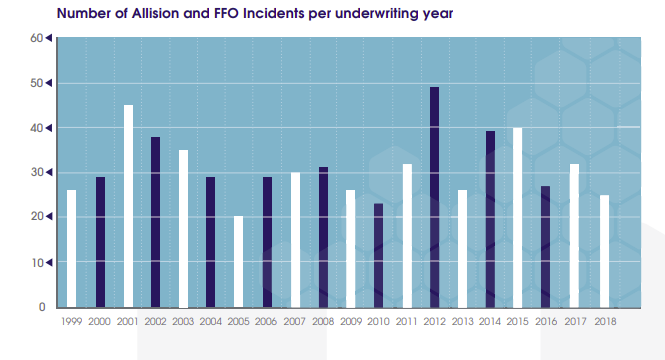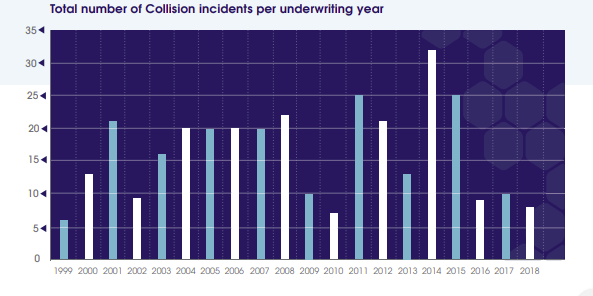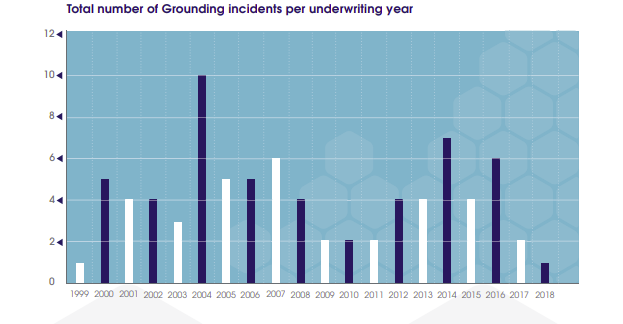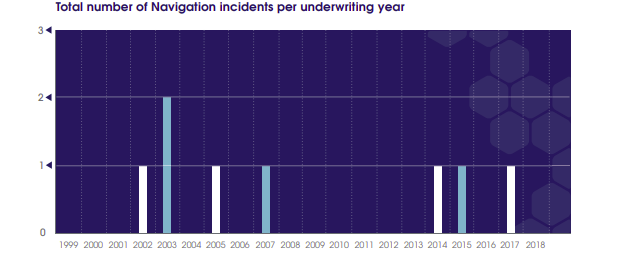Claims arising from incidents involving vessels under pilotage have exceeded US$ 1.8 billion in the 20 years between 1999 and 2019, according to data by the International Group of P&I Clubs (IG Clubs).
In a new report, IG Clubs records 1,046 such incidents in this period and each incident gave rise to P&I liabilities in excess of US$ 100,000.
The report has been prepared by the IG, in response to concerns expressed by the IG Clubs’ shipowner Boards of Directors, to understand the severity and frequency of the P&I liabilities that arise when a vessel is under pilotage, where in the world those liabilities continue to arise, and considers recommendations to mitigate the risk of such liabilities occurring in the future.
According to the report figures, the yearly average of 52 incidents equates to one incident per week and the average value of per incident is about is US$ 1.74 million.
Whilst the overall cost is substantial, the number of incidents is however very small in comparison with the overall number of acts of pilotage undertaken every year.
See also: Pilotage operations during COVID-19
In addition, the report considers incidents in four categories:
-Allision / Contact with fixed floating objects

Incidents in the first category constitute the majority (60%) of the total number and cost in excess of US$ 1.14 billion.
It is appropriate to make mention here of the small amount of data submitted for 2019 because this principally involves this incident category. There were 11 incidents reported with a total value of US$57,287,216 – an average per incident of US$5.21m. If the further incident in 2019 that is not currently in the data but which is the subject of a Pool claim notification is included, the total for this category in 2019 increases to US$79,437,216, an average per incident of US$6.62m.
It is notable that this is approaching the peak average in 2007 and that it is based upon substantially fewer incidents overall – 12 in 2019 as compared with 30 in 2007.
-Collision

Collisions represent 31% of the total incidents and cost in excess of US$ 479 million.
There were 327 Collision incidents in the 20 years covered by this report costing US$479.6m. There were on average 16 incidents per year and the average cost of each was approximately US$1.47m. There were 10 years in which the number of incidents were in excess of the average, and 10 years when they were below.
The highest number of Collision incidents occurred in 2014 when the number was twice the average, although the average cost of the incidents in that year remained close to the overall average. The most expensive years were 2009 and 2015 where the totals were US$74.9m and US$68.7m respectively.
There were however far fewer incidents in 2009 than in 2015, 10 and 25 respectively with the result that the average cost per incident in 2009 – US$7.49m – was the highest overall.
-Grounding

There were 81 groundings in the period 1999-2018, an average of 4 per year. These incidents cost US$190.5m – approximately 10% of the aggregate for all categories. The yearly average was approximately US$9.5m. As may be expected given the circumstances required for a grounding to occur, the frequency of these incidents is much lower than that for the Allision/FFO and Collision categories.
However, notwithstanding the lower frequency, the average value of Grounding incidents – US$2.35m – is the highest of all and compares with averages of US$1.82m and US$1.47m for Allision/FFO and Collision respectively.
-Navigation (e.g. wash of a vessel)

This category of incident involves an absence of contact by the vessel and principally comprises claims arising from
the wash of the vessel under pilotage.
There were eight incidents in the 20 -year period. The total cost was US$2.74m, an overall average of approximately US$137,000 per year. If the years in which there were zero incidents are excluded, the yearly average cost becomes approximately US$392,000. The most incidents occurred in 2003 when there were two which constituted 40% of the total exposure over the entire period. The average cost per incident is approximately US$343,000.
Recommendations
In those instances where no flag state investigation will be made, some structure needs to be established that will facilitate fact-finding, root cause analysis and risk mitigation measures for more costly incidents, or those where more egregious conduct is evident.
Perhaps a MoU approach under which there is a commitment to cooperate with the IG Clubs on the part of the more significant pilotage bodies, hopefully with the support of IMPA, in investigating the causes of more serious incidents for the purpose of identifying measures that will assist in preventing further loss. Such MoUs should provide for:
- joint incident investigations leading to establishing meaningful root causes,
- a platform to co-operate in formulating lessons learnt without appointing blame, and
- tracking the implementation of mitigating measures in the long term.
If that recommendation is accepted, further work will be necessary to draft the terms of a MoU and identify the principal entities who should be approached with this initiative.
This work might usefully start with the pilotage bodies involved with the most serious container vessel/gantry crane incidents. It should also be noted that IMPA has been closely following the incidents involving large container ships and has made submissions on this topic to the IMO’s Sub-Committee on Implementation of IMO Instruments.
These seek an expert review of relevant Marine Safety Investigation Reports on such incidents with a view to identifying measures that will improve operational safety and enhance safe berthing procedures…Another area of initial focus could also be the Suez Canal Authority given the frequency of groundings in that waterway.
READ MORE ABOUT PILOTAGE CLAIMS IN THE IG P&I CLUBS REPORT HERE































































